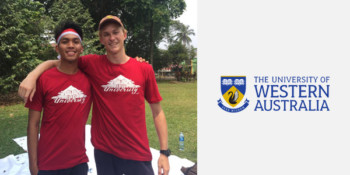Lucas Cary is a 2019 New Colombo Plan Scholar from The University of Western Australia. Lucas undertook the Indonesian Language Short Course at Satya Wacana Christian University in July 2019 before continuing to the Agriculture Semester Program at Bogor Agricultural University in Semester 2, 2019.
Q: Why did you decide to undertake ACICIS’ Agriculture Semester Program (ASP)?
The Agricultural Semester Program (ASP) formed an integral part of my New Colombo Plan (NCP) scholarship. Prior to ASP beginning, I spent one month living and studying in Salatiga, Central Java. At Universitas Kristen Satya Wacana I studied bahasa Indonesia (Indonesian language), while living with a local Indonesia family and immersing myself culturally. This formed the foundation for the ASP, which I began in August. I was motivated to study in Indonesia because I was seeking a truly immersive experience, which I knew that Indonesia could provide. I wanted to be pushed outside my comfort zone and challenged to adapt. The aim of this was to come across a diversity of cultural experiences, meet an array of people and visit a range of natural landscapes. Ultimately this would provide me with a greater understanding of a different nation and lead to personal growth and understanding. Additional motivation for doing ASP included the units offered at IPB University and its strategic location. The range of units offered in English both suited my Environmental Science and Marine Science degrees while also providing expansion to increase my scope of skills. Bogor provided an ideal study location, close enough to Jakarta to be accessible, but far enough away to enjoy cooler temperatures and Bogor’s ideal situation for weekend trips to the coast for surfing and various national parks (with mountains, hot springs and waterfalls all on offer).
Q: What classes/units are you currently enrolled in?
Entrepreneurial Experience – gaining business experience by developing a product idea into reality over the semester period.
Indonesian Archipelago: Animal Biodiversity – learning about the high biodiversity in Indonesia, how it formed and how it is currently managed and maintained.
Tropical Biodiversity Conservation – diversity, threats and conservation in the wild and in conservation facilities, with a specific emphasis on threatened and important species in Indonesia.
Rural and Urban Biodiversity – tropical biodiversity study in the rural and urban community, with interesting topics such as bioenergy and natural dyes.
Q:How has your study in Indonesia influenced your understanding of the environment in the region?
It has allowed me to expand upon my initially limited knowledge, building a strong evidence-based understanding of the high diversity of Indonesian species, the current threats to these species and what conservation is underway. This has included examining case studies specific to the Indonesian region and going on multiple field trips.
Q: What do you like to do in your spare time in Bogor?
I don’t spend much spare time in Bogor. During the week I am busy with university and my internship, as well as maintaining a balance of exercise, language practice and other important life facets. On the weekends, Bogor is an ideal location to go travelling from. I have spent many weekends surfing in Cimaja (3-hour bus ride from Bogor), however, when I’m not surfing on the weekends I’m usually travelling to experience as much of Indonesia as possible in my limited time here!
Q: Are you undertaking an internship while in Indonesia (brief description)?
Yes. I am interning at the global headquarters for the Centre for International Forestry Research (CIFOR). I am working on two main projects, one looking at bushmeat hunting practices in Papua and the other examining the relationship between climate finance, gender and poverty.
Q: Favourite Indonesian food:
Breakfast: Nasi uduk or nasi kuning.
Lunch/dinner: Sate ayam, mie ayam, cap cay, any good Makanan Padang.
Q: Favourite place to eat:
Bara. Street next to campus bustling with traffic and all kinds of local foods from as little as AUD 80 cents per meal.
Q: Favourite Indonesian word/phrase:
Indonesian people type ‘wkwk’ instead of ‘haha’, but no one says ‘wkwk’ when they are laughing out loud. Still yet to find an explanation for this.
Q: What places in Indonesia have you visited during your semester so far?
Lots! Central Java (Salatiga, Solo, Semarang, Yogyakarta, Pacitan, Mt Andong), Jakarta, Thousand Islands, West Java (Bogor, Cimaja (maybe eight times), Puncak, Mt Halimun Salak NP), Jakarta, Bali (Lembongan, Uluwatu, Djimbaran), Bintan Island, Lombok and Gili Islands.
Q: Your testimonial regarding IPB?
IPB University is a great place to study. It has a beautiful campus, with lots of greenery, a welcoming feeling and nice places to grab a cheap coffee. The classes were extremely informative and interesting, with lecturers engaging well with all classes and topics. The students were always happy to help and very friendly, allowing me to make many friends. The campus location is also very good with everything nearby, including food, shops and a gym.


